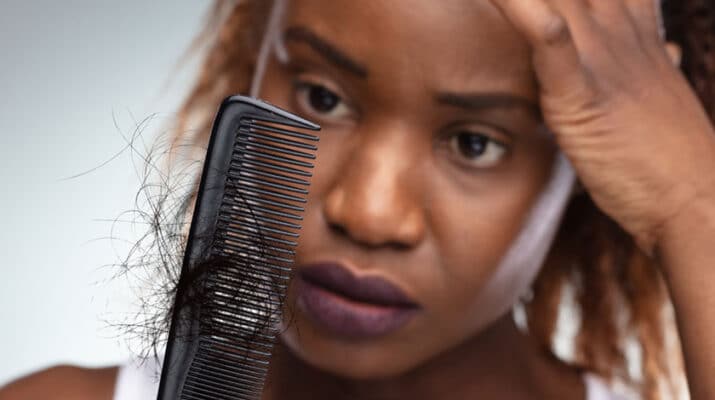Quite a few things good for your whole body are good for your hair
By Deborah Jeanne Sergeant

Male pattern baldness is very difficult to treat. However, in many cases, women’s hair loss can be treated successfully. Unlike the “horseshoe” pattern of baldness affecting men, women tend to experience overall thinning or thinning at the temples, with the exception of alopecia areata, an autoimmune disease, which causes recurring patchy baldness.
Most women experience extreme shedding after pregnancy, but that is normal. They are shedding only the extra hair gained during pregnancy to get back to pre-pregnancy thickness. Hormones also influence hair thickness during perimenopausal, as a reduction in reproductive hormones can mean thinner hair. For extreme cases or for those who want to instantly add volume to their hair may consider a hair transplant procedure.
For either case, Kelly Springer, registered dietitian and owner of Kelly’s Choice Nutritional Company in Skaneateles, encourages women to eat a healthful diet to support both good health and healthy hair.
“No supplement is going to replace real food because of the perfect way foods are naturally packaged,” Springer said. “It’s why no supplement will ever take the place of food.”
Vitamin D can affect digestive health and many people are deficient in D. Since few foods contain D and it is generated through sunlight; Springer said that supplementation may be necessary in the winter.
“If you don’t have strong digestive health in good gut microbiome, that truly can affect anything from bone loss to hair health,” Springer said.
A healthful diet should also include adequate protein and iron, from foods such as beef. Many fruits and vegetables are good sources of vitamins A and vitamin C.
“These have been correlated with protecting our hair follicles and helping boost collagen production,” Springer said.
Whole grains, nuts and seeds are sources of B vitamins and, in some cases omega-3 fatty acids. Springer said these reduce inflammation.
“Foods that counteract inflammation will encourage hair growth and prevent hair loss and promote healthy skin and nails,” Springer said.
Adequate hydration is also important to healthy hair.
Limiting damage to hair can help hair appear fuller. Damage can be caused by heat, chemical treatments such as coloring, perming, straightening or wearing tight braids, buns or ponytails. Use gentle products on the hair and avoid rubbing it or combing it while it is wet.
Hair loss may be caused by certain prescriptions. Rich Pinckney, pharmacist with Rx City Pharmacy in Auburn, listed medications that treat seizures, migraine headaches, weight loss diabetes, heart disease and high blood pressure.
“All of them can cause hair loss,” Pinckney said. “We try to limit the amount of exposure to certain drugs but unfortunately, when you alter the body, it alters the body systems. Every medication—anything you put in your mouth—will have a side effect. Read the pamphlet your pharmacy gives you. Talk with your pharmacist who can coach your doctor. Or he can talk with your doctor and refer you from dietary to see if it’s coming from there.”
Ramsay Farah, dermatologist with Farah Dermatology in Syracuse, said that genetics and hormones can affect hair thickness.
“You should get an evaluation by a physician,” Farah said. “The physician should draw a battery of tests. Obviously, some will include hormone values and other tests as well to make sure the hair loss isn’t from a hormonal issue or related to lupus or anemia or another medical condition. It’s good to get a set of lab tests to make sure it’s not something else.”
Once the reason is determined, a provider can use the best approach. Some can be resolved with over-the-counter Rogaine or Minoxidil. Prescription medication may also help, such as spironolactone.
“That’s a blood pressure medicine, but one of the side effects is it blocks the conversion of androgen to its active form,” Farah said. “If you block the hormones from becoming active, they don’t act on the hair. In a similar hormone blocking fashion, there are other medicines like finasteride that one would give for men with enlarge prostate and lower doses to women.”
Platelet rich plasma is among the newer treatments for hair loss. A provider draws the patient’s blood, separates the cells from the plasma, and then injects the platelet-rich plasma.
“Attached to those platelets are a lot of growth factors that cause the hair stem cells to activate and grow hair,” Farah said.
Surgical options such as a Therapeutic hair transplant may also offer lasting results.

